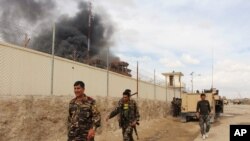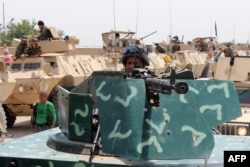Afghanistan's Taliban said Saturday that it would strongly retaliate for the resumption of U.S. airstrikes against the insurgent group, and it rejected assertions that bombing operations ever paused.
The U.S. military began anti-Taliban air raids in the last week, but it has declined to provide details.
The move came just days after President Barack Obama expanded the authorities under which U.S. troops in Afghanistan can attack insurgents; attacks can now proceed as long as they help the Afghan offensive succeed.
"U.S. airstrikes have continued against our countrymen from the onset of the [foreign] invasion. There has been no cessation, so talk of restart is hollow," said Taliban spokesman Zabihullah Mujahid.
'Harsher' response
The increase in U.S. airstrikes will be met with a "harsher" reaction from the Islamist insurgency, he said in a statement sent to reporters.
"The Afghan Mujahid nation is now used to airstrikes. Continuation of bombings cannot break the will of this nation nor subdue them," Mujahid asserted.
The U.S. military spokesman in Kabul, Brigadier General Charles Cleveland, said it would be premature to discuss the battlefield impact of the "limited number of strikes" conducted under the new authorities.
"But really, the goal is to help achieve a strategic effect," he told reporters Thursday. "Using these authorities, of course, one evening or a couple of days is probably not going to ultimately result in the strategic effect. It will be a combination of the use of enablers, and it will be combined with Afghan operations over a period of time."
Cleveland noted a relative reduction in the Afghan fighting because of the Muslim fasting month of Ramadan, but he predicted hostilities would intensify in July.
"We recognize that we are still very early in the fighting season and that there is a long way to go, and that the ANDSF [Afghan National Defense Security Forces] are going to suffer casualties and they are going to have bad days. There is no doubt about that," he said.
U.S. cutback ahead
The Afghan military has struggled in the battle against the Taliban since taking the lead from foreign troops in 2014.
A residual U.S. force of 9,800 soldiers in Afghanistan has since been involved primarily in a train-advise-and-assist mission for local forces. The number of U.S. troops is set to decrease to 5,500 by the end of this year.
Until now, U.S. commanders were authorized only to use airstrikes to protect their forces on the ground and to protect Afghan partners when they faced being overrun by the Taliban, or to go after the Islamic State or the remnants of al-Qaida.
Afghan security forces suffered 6,637 personnel killed and 12,471 wounded in 2015, according to the U.S. Special Inspector General for Afghanistan Reconstruction (SIGAR).
"In the first two months of 2016, an additional 820 members of the Afghan security forces were killed in action and 1,389 were wounded," SIGAR said in its quarterly report, quoting U.S military officials.





